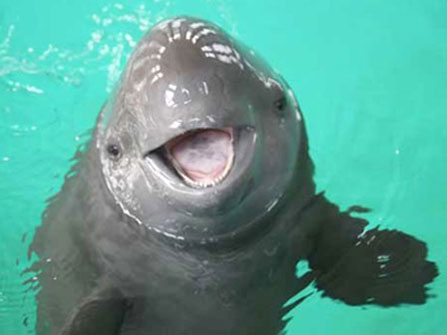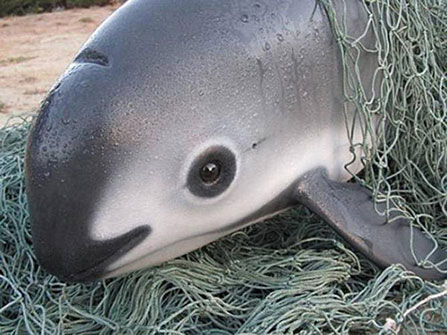As deaths of vaquita porpoise increase, activists demand total ban on harmful fishing practices
SAN FELIPE
One month after organizations working to protect the world's smallest porpoise demanded that the federal government permanently ban the use of fishing practices that threaten the animal, authorities detained a boat owner who was caught illegally using a trawl net within the vaquita marina sanctuary in the Upper Gulf of California.
All fishing activity using any type of gill net or trawl net within the refuge is prohibited because their use is deadly to the vaquita (Phocoena sinus), an endangered marine mammal. Their only known natural habitat is the Upper Gulf of California where only an estimated 50 to 100 animals are believed to survive.
The current prohibition of those fishing practices harmful to the species is only effective from April 2015 to April 2017. It excludes the use of all drift nets, seine nets, and long lines operated by small boats within the vaquita’s habitat.
After the discovery in April 2016 of three dead vaquitas in the waters of Puerto San Felipe, all with signs of having been injured by nets and rope, the organizations demanded the permanent ban of these fishing techniques. The organizations are: The Animal Welfare Institute, Centro Mexicano de Derecho Ambiental, A.C. [Mexican Center for Environmental Law - Cemda], the Centro para la Diversidad Biológica, Defenders of Wildlife, Mexico, the Fundación Antonio Haghenbeck y De La Lama I.A.P., Greenpeace, and Producciones Serengueti.
“Everything seems to indicate that not even the prohibition on certain fishing methods, or patrols in the area to verify that the prohibitions are honored, are proving effective,“ they add.
The Federal Attorney for Environmental Protection (Profepa) carried out the necropsies on the three cetaceans in Tijuana at the facilities of the Zoo Internacional and the veterinary clinic of Dr. Alexander Brown. The remains were placed in cold storage at Profepa facilities in Mexicali for future studies.
“Faced with the possibility that these animals died trapped in nets or because of human activity, authorities have intensified night time patrols and inspections on land and at sea, especially in those areas found to be dumpsites for totoaba nets. They have also reached out to the fishing community in order to raise their members' awareness about not poaching or using prohibited fishing techniques,” said Profepa.
In March, Sea Shepard Conservation Society, an organization that is fully engaged in the vaquita rescue campaign, found another dead porpoise floating near San Felipe, in what Profepa confirmed was an advanced stage of decomposition.
Because of the amount of decomposition, it was not possible to determine the cause of the animal’s death or if it was caused by human activity,” Profepa’s report concluded. The remains of the animal are also in Profepa’s cold storage facility in Mexicali.
Alejandro Olivera from the Centro para la Diversidad Biológica noted that there are three deficiencies in the conservation program: monitoring in the refuge is neither sufficient nor effective; the alternative fishing techniques that currently exist are not being incentivized as they should be in order to ensure their use; and there is an almost complete lack of research on and development of new techniques.”
Activists accepted that “the federal government’s proposed measures are a good start, but they must be carried out effectively.” And they pointed out that: “what is lacking are resources to reinforce the monitoring patrols in the zone and provide the fishing community with alternative fishing methods that will allow it to continue to fish without becoming a threat, not only to the vaquita, but also to the totoaba (Totoaba macdonaldi), another endangered species in the gulf.
More than 140,000 people signed a petition demanding that the measures to protect the vaquita be made permanent. People can add their names on the Vaquita's Greenpeace page.
Miguel Rivas, coordinator of the Ocean Campaign for Greenpeace Mexico, pointed out: “There are very few individuals remaining so it is important to protect them now. If we don’t, then it won´t be very long before they have completely disappeared. Each time we lose a species, genetic capital and environmental equilibrium is lost, and in this case it will be from our oceans.”


